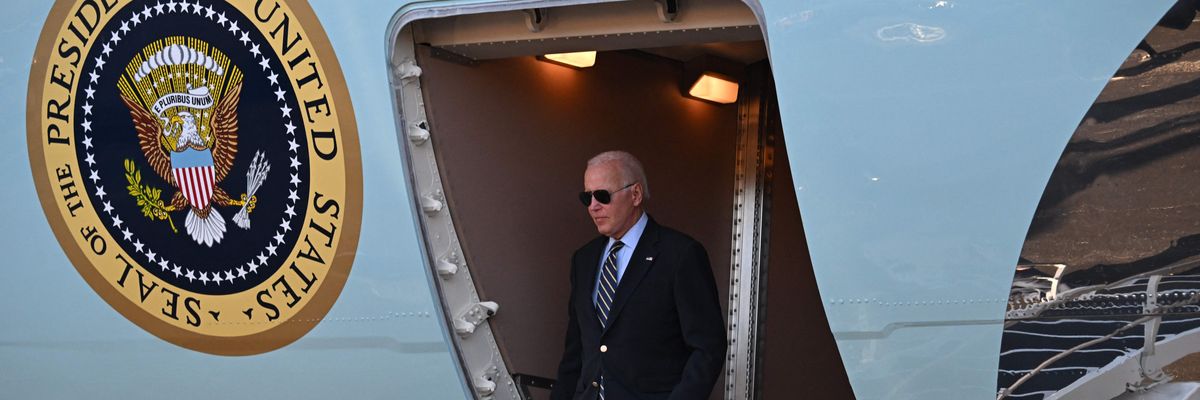As President Joe Biden prepares to visit Maui next week amid Hawaiian wildfires that have prompted a federal disaster declaration, he faces fresh calls to declare a national climate emergency and support a pair of local lawsuits against the planet-wrecking fossil fuel industry.
The lawsuits against Big Oil were filed in 2020 by Oahu's City and County of Honolulu as well as Maui County—where a fire last week killed at least 111 people, caused over $5 billion in damage, and devastated Lahaina, the former capital of the Hawaiian Kingdom. Both complaints highlight how rising global temperatures are making fires on the islands worse.
"Hawaii communities are on the frontlines of the fight to hold Big Oil companies accountable for knowingly increasing the risks of deadly wildfires and other climate disasters," Richard Wiles, president of the Center for Climate Integrity (CCI), said Friday. "President Biden should unequivocally voice his support for the people of Maui and Honolulu in their efforts to put fossil fuel companies on trial for their climate deception and make polluters pay for the damage they have caused."
The Supreme Court of Hawaii on Thursday heard oral arguments for the fossil fuel industry's attempts to dismiss the Honolulu case. After the hearing, Matthew Gonser, chief resilience officer and executive director of Honolulu's Office of Climate Change, Sustainability, and Resiliency, said: "We appreciate today's thorough inquiry and remain confident in the strength of our case. We look forward to the court's forthcoming decision as we continue to litigate the case and move toward trial."
Just ahead of the hearing, CCI declared that "the deadly fires in Maui underscore how urgent it is to make polluters pay for fueling the climate crisis," and "the people of Honolulu and Maui deserve their day to put Big Oil on trial."
Wiles added Friday that "simply connecting the deadly Maui fires and other recent disasters to climate change is not enough; it's time for President Biden to make clear to the American people that the oil and gas industry must be held accountable for their lies and pollution that continue to fuel the climate crisis."
Whether Biden will take a position on the Hawaiian climate cases is hard to predict, given his administration's mixed messages on such litigation. While the U.S. Department of Justice in March backed Colorado communities suing Big Oil, the DOJ has also recently claimed in a federal court filing for the youth-led case Juliana v. United States that "there is no constitutional right to a stable climate system."
The president and First Lady Jill Biden are scheduled to visit Maui on Monday. According to the White House, the Bidens "will be welcomed by state and local leaders to see firsthand the impacts of the wildfires and the devastating loss of life and land that has occurred on the island, as well as discuss the next steps in the recovery effort."
The historic blaze that spread rapidly because of winds from Hurricane Dora and ultimately leveled Lahaina has sparked national conversations about the climate emergency. Scientists have long warned that producing planet-heating emissions with human activities like fossil fuel use will make fires and hurricanes more devastating.
The wreckage and early assessments of what rebuilding requires have also generated fears among locals about more exploitation from rich outsiders—continuing a long trend in the Hawaiian Islands, which were annexed by the United States in 1898 and became the 50th state in 1959.
Kaniela Ing, national director of the Green New Deal Network and a seventh-generation Kanaka Maoli (Native Hawaiian) from Maui, wrote Thursday for TIME that "it felt like Goddess Papahānaumoku—Earth Mother, herself—raging at humanity's hubris. The disturbing silence left by the missing and the mourned souls tells of a disaster that's unnatural, shaped by the human hand—a byproduct of the dangerous dance between climate change and centuries of colonial greed."
"My greatest fear is that this trajectory of exploitation will continue in the recovery from the Maui wildfires," he continued. "As whispers of reshaping Lahaina emerge, with wealthy developers eager to mold it to their vision, our generation's vision for social and environmental justice grows even firmer. Our recovery from the wildfires can't just be about combating climate change—it has to be about returning control of our cherished lands to the people who hold them dear."
"At the national level, it's past time for President Biden to officially recognize the climate crisis by declaring a climate emergency," added Ing, a former state legislator. "This would enable him to halt the destructive fossil fuel production driving these disasters. Furthermore, substantial federal investments on the scale of trillions are required to prevent catastrophes like this one in the future and prioritize the welfare of working families in mitigation and recovery efforts."
The Hawaiian fires are part of a summer of unprecedented heat that scientists already concluded "would have been virtually impossible" without the burning of fossil fuels—conditions that have inspired other demands for a climate emergency declaration.
The Center for Biological Diversity last year released a report detailing all that Biden could do if the heeded those calls. Report co-author Jean Su said at the time that "declaring a climate emergency isn't a catchphrase, it's a vital suite of actions to protect people and the planet from this crisis."

